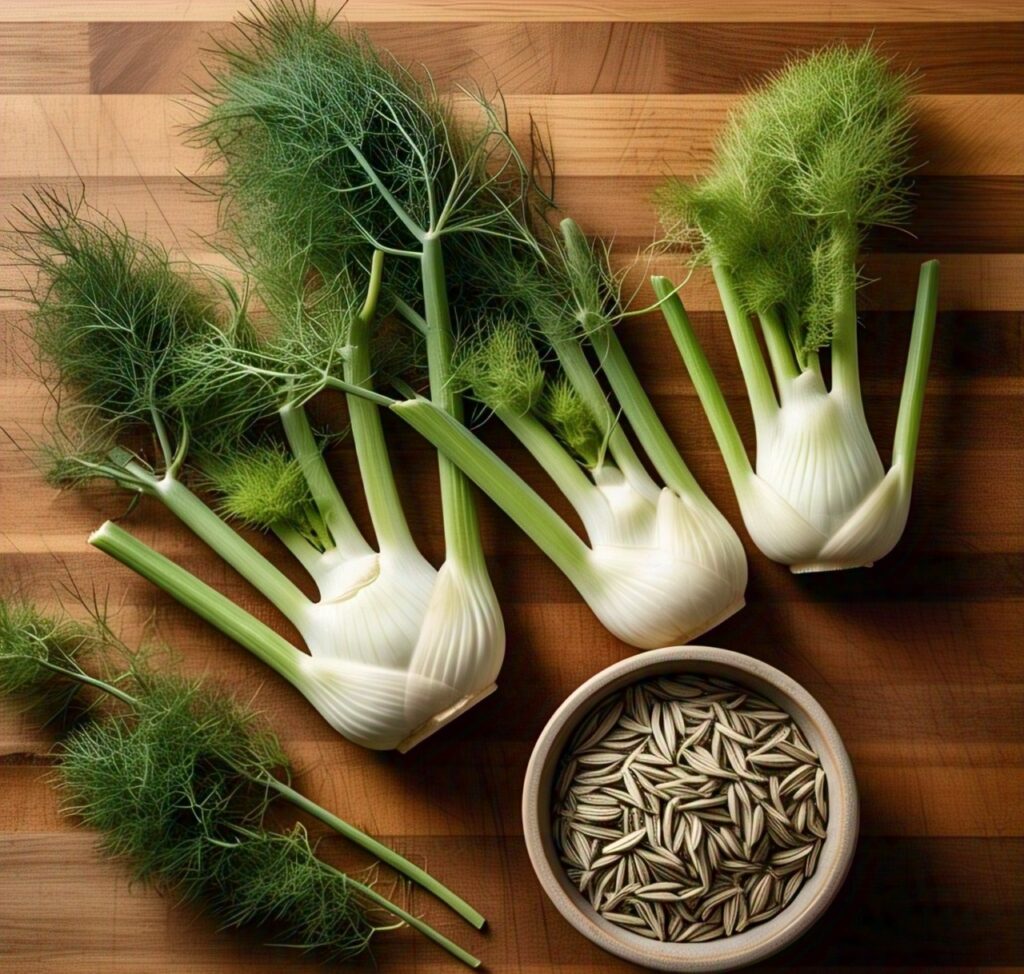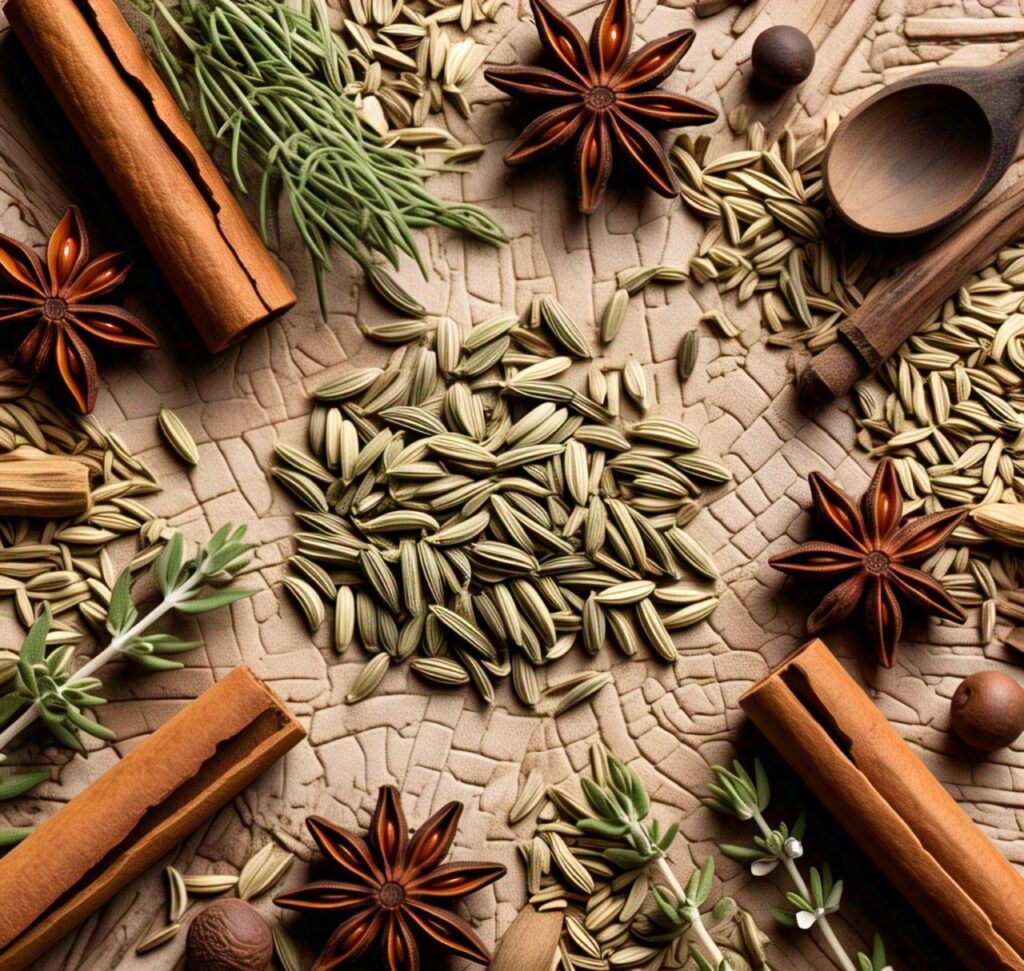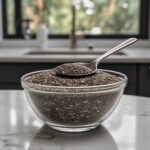
Introduction: Why Fennel Seeds Deserve a Spot in Your Pantry
If you’ve ever munched on a handful of crunchy, aromatic fennel seeds after a meal, you’re already familiar with one of nature’s most versatile little wonders. Fennel seeds (Foeniculum vulgare) might be small, but their impact on flavor, digestion, and health is enormous. Often overlooked in favor of flashier superfoods, these tiny seeds have been treasured for thousands of years—from ancient Egyptian medicine to Ayurveda—for their powerful healing properties and culinary charm.
Whether you’re a foodie looking to elevate your recipes or someone curious about natural health remedies, fennel seeds offer a unique blend of benefits that deserve a deeper dive. So, let’s unravel the science, history, and secrets of this remarkable spice.
A Quick Comparison: Fennel Seeds vs. Similar Seeds
To appreciate fennel seeds fully, it’s helpful to understand how they compare to other commonly used seeds like anise and caraway:
| Seed Type | Flavor Profile | Common Uses | Key Benefits |
|---|---|---|---|
| Fennel Seeds | Sweet, slightly licorice, aromatic | Culinary seasoning, digestive aid, herbal tea | Digestive health, antioxidant-rich, anti-inflammatory |
| Anise Seeds | Stronger licorice flavor, sweeter | Baking, flavoring liquors | Digestive aid, anti-spasmodic |
| Caraway Seeds | Earthy, nutty, mild licorice | Bread, cheese, savory dishes | Digestive support, antimicrobial |
Unlike anise, which has a more intense licorice taste, fennel seeds provide a milder sweetness making them incredibly versatile. They also pack more antioxidants than caraway, adding a protective edge to their culinary uses.
The History and Cultural Significance of Fennel Seeds
Fennel seeds have been used for millennia—dating back to ancient Egypt, Greece, and Rome. They were considered sacred, often associated with longevity and vitality. The Greek physician Hippocrates used fennel for digestive issues, while Ayurvedic medicine classifies it as a balancing herb for Vata and Kapha doshas, promoting digestive fire and detoxification.
This rich cultural tapestry highlights fennel seeds as more than just a flavor enhancer—they are a bridge between traditional wisdom and modern science.
Health Benefits of Fennel Seeds Backed by Science

1. Digestive Health Booster
Fennel seeds are widely acclaimed for their ability to relieve bloating, gas, and indigestion. The seeds contain compounds like anethole, which relax intestinal muscles and promote smooth digestion. A study published in the Journal of Ethnopharmacology confirms fennel’s effectiveness in reducing gastrointestinal spasms and cramps.
2. Antioxidant Powerhouse
Loaded with antioxidants such as quercetin and rutin, fennel seeds combat oxidative stress, which is linked to aging and chronic diseases. Including fennel in your diet can support your body’s defense against free radicals.
3. Anti-inflammatory Properties
Chronic inflammation underlies many health issues, from arthritis to heart disease. Fennel seeds possess anti-inflammatory effects that may help reduce this risk, according to research in the Phytotherapy Research journal.
4. Hormonal Balance and Menstrual Relief
Preliminary studies show fennel seeds may help ease menstrual discomfort and regulate hormones, making them a popular natural remedy among women.
5. Respiratory Health Support
Traditionally, fennel seeds have been used to clear congestion and soothe coughs. Their expectorant qualities can aid in respiratory wellness, especially during cold and flu seasons.
How to Use Fennel Seeds: Culinary and Beyond
The magic of fennel seeds is in their versatility:
Culinary Uses:
- As a digestive aid: Many cultures chew fennel seeds post-meal to freshen breath and aid digestion.
- In cooking: They add a subtle sweetness to breads, curries, salads, and even desserts.
- Fennel tea: Steep 1 teaspoon in hot water for 5–10 minutes to enjoy a soothing, aromatic tea.
- Spice blends: Common in Italian sausage, Indian masalas, and Middle Eastern dishes.
Non-Culinary Uses:
- Essential oil: Used in aromatherapy for digestive and respiratory relief.
- Natural breath freshener: Fennel seeds’ antibacterial properties help combat oral bacteria.
Personal Experience: How Fennel Seeds Transformed My Digestion
For years, I struggled with occasional bloating after meals, especially heavy or spicy foods. Incorporating a simple ritual of chewing a teaspoon of fennel seeds after dinner made a remarkable difference. Not only did my digestion improve, but I also enjoyed the refreshing, mildly sweet flavor. It felt like a small, natural reset button for my gut after each meal.
Quick Tips for Buying and Storing Fennel Seeds

- Buy whole seeds rather than powders for maximum freshness and potency.
- Look for organic, non-irradiated fennel seeds to avoid pesticide residues.
- Store in an airtight container, away from sunlight and moisture, to maintain aroma and benefits.
Table: Nutritional Breakdown of Fennel Seeds (per 100g)
| Nutrient | Amount | % Daily Value* |
|---|---|---|
| Calories | 345 kcal | 17% |
| Protein | 15.8 g | 32% |
| Fat | 14.9 g | 23% |
| Carbohydrates | 52.3 g | 17% |
| Fiber | 39.8 g | 160% |
| Calcium | 1196 mg | 120% |
| Iron | 18.5 mg | 103% |
| Magnesium | 385 mg | 96% |
| Potassium | 1694 mg | 36% |
*Percent daily values are based on a 2,000-calorie diet.
Where to Learn More and Explore
If you want to deepen your knowledge, check out PubMed articles on fennel seed benefits or visit the National Center for Complementary and Integrative Health for comprehensive insights.
Conclusion: Small Seed, Big Impact
Fennel seeds are more than just a flavorful spice—they are a natural powerhouse packed with benefits for digestion, inflammation, hormone balance, and more. By incorporating these humble seeds into your daily routine, whether through cooking or tea, you invite centuries of traditional wisdom and modern science into your health journey.
Call to Action
Have you tried fennel seeds before? Share your experiences or favorite recipes in the comments! If you want more natural health tips and delicious spice guides, subscribe to our newsletter and never miss an update. Ready to explore the flavorful world of fennel seeds? Grab some from your local store or online and start your wellness journey today!
Fennel Seeds: The Little Seed with Big Benefits You Didn’t Know About
Meta Title:
Fennel Seeds Benefits, Uses & Nutritional Power: Unlock the Secrets of This Ancient Spice
Meta Description:
Discover the amazing health benefits and uses of fennel seeds. Learn why this ancient spice is a kitchen staple for wellness and flavor.
Introduction: Why Fennel Seeds Deserve a Spot in Your Pantry
If you’ve ever munched on a handful of crunchy, aromatic fennel seeds after a meal, you’re already familiar with one of nature’s most versatile little wonders. Fennel seeds (Foeniculum vulgare) might be small, but their impact on flavor, digestion, and health is enormous. Often overlooked in favor of flashier superfoods, these tiny seeds have been treasured for thousands of years—from ancient Egyptian medicine to Ayurveda—for their powerful healing properties and culinary charm.
Whether you’re a foodie looking to elevate your recipes or someone curious about natural health remedies, fennel seeds offer a unique blend of benefits that deserve a deeper dive. So, let’s unravel the science, history, and secrets of this remarkable spice.
A Quick Comparison: Fennel Seeds vs. Similar Seeds
To appreciate fennel seeds fully, it’s helpful to understand how they compare to other commonly used seeds like anise and caraway:
| Seed Type | Flavor Profile | Common Uses | Key Benefits |
|---|---|---|---|
| Fennel Seeds | Sweet, slightly licorice, aromatic | Culinary seasoning, digestive aid, herbal tea | Digestive health, antioxidant-rich, anti-inflammatory |
| Anise Seeds | Stronger licorice flavor, sweeter | Baking, flavoring liquors | Digestive aid, anti-spasmodic |
| Caraway Seeds | Earthy, nutty, mild licorice | Bread, cheese, savory dishes | Digestive support, antimicrobial |
Unlike anise, which has a more intense licorice taste, fennel seeds provide a milder sweetness making them incredibly versatile. They also pack more antioxidants than caraway, adding a protective edge to their culinary uses.
The History and Cultural Significance of Fennel Seeds
Fennel seeds have been used for millennia—dating back to ancient Egypt, Greece, and Rome. They were considered sacred, often associated with longevity and vitality. The Greek physician Hippocrates used fennel for digestive issues, while Ayurvedic medicine classifies it as a balancing herb for Vata and Kapha doshas, promoting digestive fire and detoxification.
This rich cultural tapestry highlights fennel seeds as more than just a flavor enhancer—they are a bridge between traditional wisdom and modern science.
Health Benefits of Fennel Seeds Backed by Science
1. Digestive Health Booster
Fennel seeds are widely acclaimed for their ability to relieve bloating, gas, and indigestion. The seeds contain compounds like anethole, which relax intestinal muscles and promote smooth digestion. A study published in the Journal of Ethnopharmacology confirms fennel’s effectiveness in reducing gastrointestinal spasms and cramps.
2. Antioxidant Powerhouse
Loaded with antioxidants such as quercetin and rutin, fennel seeds combat oxidative stress, which is linked to aging and chronic diseases. Including fennel in your diet can support your body’s defense against free radicals.
3. Anti-inflammatory Properties
Chronic inflammation underlies many health issues, from arthritis to heart disease. Fennel seeds possess anti-inflammatory effects that may help reduce this risk, according to research in the Phytotherapy Research journal.
4. Hormonal Balance and Menstrual Relief
Preliminary studies show fennel seeds may help ease menstrual discomfort and regulate hormones, making them a popular natural remedy among women.
5. Respiratory Health Support
Traditionally, fennel seeds have been used to clear congestion and soothe coughs. Their expectorant qualities can aid in respiratory wellness, especially during cold and flu seasons.
How to Use Fennel Seeds: Culinary and Beyond
The magic of fennel seeds is in their versatility:
Culinary Uses:
- As a digestive aid: Many cultures chew fennel seeds post-meal to freshen breath and aid digestion.
- In cooking: They add a subtle sweetness to breads, curries, salads, and even desserts.
- Fennel tea: Steep 1 teaspoon in hot water for 5–10 minutes to enjoy a soothing, aromatic tea.
- Spice blends: Common in Italian sausage, Indian masalas, and Middle Eastern dishes.
Non-Culinary Uses:
- Essential oil: Used in aromatherapy for digestive and respiratory relief.
- Natural breath freshener: Fennel seeds’ antibacterial properties help combat oral bacteria.
Personal Experience: How Fennel Seeds Transformed My Digestion
For years, I struggled with occasional bloating after meals, especially heavy or spicy foods. Incorporating a simple ritual of chewing a teaspoon of fennel seeds after dinner made a remarkable difference. Not only did my digestion improve, but I also enjoyed the refreshing, mildly sweet flavor. It felt like a small, natural reset button for my gut after each meal.
Quick Tips for Buying and Storing Fennel Seeds
- Buy whole seeds rather than powders for maximum freshness and potency.
- Look for organic, non-irradiated fennel seeds to avoid pesticide residues.
- Store in an airtight container, away from sunlight and moisture, to maintain aroma and benefits.
Table: Nutritional Breakdown of Fennel Seeds (per 100g)
| Nutrient | Amount | % Daily Value* |
|---|---|---|
| Calories | 345 kcal | 17% |
| Protein | 15.8 g | 32% |
| Fat | 14.9 g | 23% |
| Carbohydrates | 52.3 g | 17% |
| Fiber | 39.8 g | 160% |
| Calcium | 1196 mg | 120% |
| Iron | 18.5 mg | 103% |
| Magnesium | 385 mg | 96% |
| Potassium | 1694 mg | 36% |
*Percent daily values are based on a 2,000-calorie diet.
Where to Learn More and Explore
If you want to deepen your knowledge, check out PubMed articles on fennel seed benefits or visit the National Center for Complementary and Integrative Health for comprehensive insights.
Conclusion: Small Seed, Big Impact
Fennel seeds are more than just a flavorful spice—they are a natural powerhouse packed with benefits for digestion, inflammation, hormone balance, and more. By incorporating these humble seeds into your daily routine, whether through cooking or tea, you invite centuries of traditional wisdom and modern science into your health journey.
Call to Action
Have you tried fennel seeds before? Share your experiences or favorite recipes in the comments! If you want more natural health tips and delicious spice guides, subscribe to our newsletter and never miss an update. Ready to explore the flavorful world of fennel seeds? Grab some from your local store or online and start your wellness journey today!




Your point of view caught my eye and was very interesting. Thanks. I have a question for you.